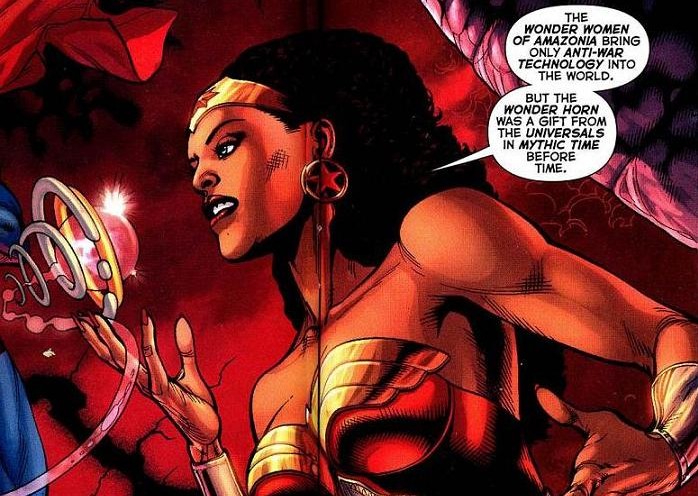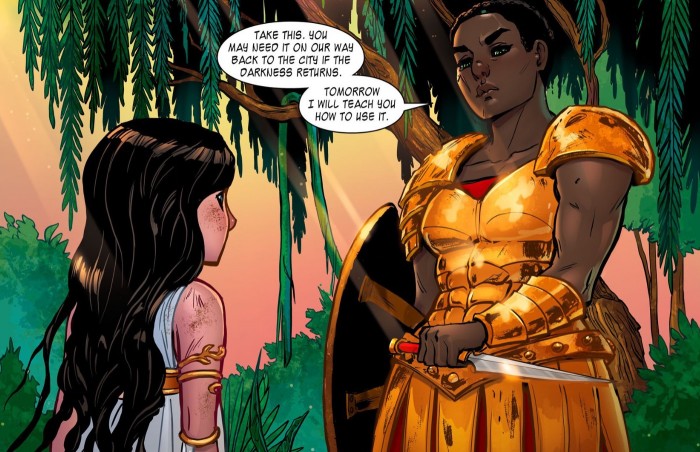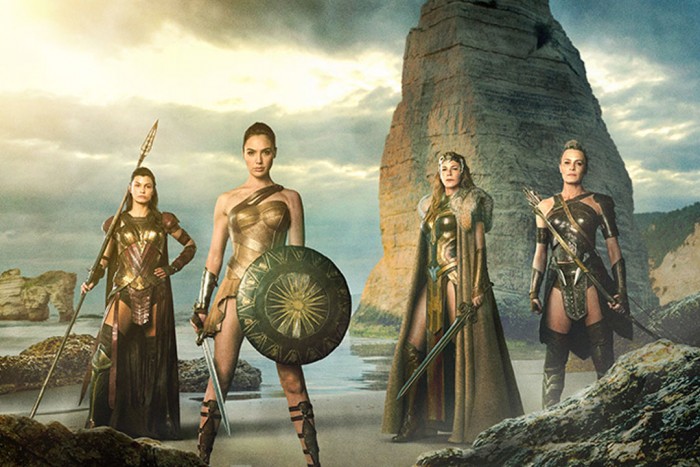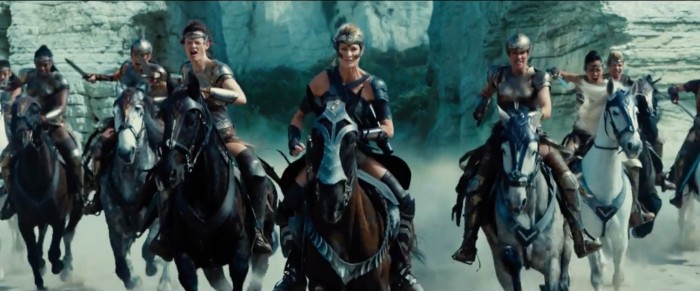'Wonder Woman,' Women Of Color, And Building A Diverse Themiscyra
Wonder Woman is the hero all women can look up to. Or so she's supposed to be. Wonder Woman was created during a time when not all women were perceived as equal, or even as women. Wonder Woman, historically, has been a hero for white women exclusively.
Wonder Woman's fellow '40s feminist icon-in-arms, Rosie the Riveter, has also been created by white America for white America, despite the fact that women of all races helped with the war effort. Nowadays, Rosie the Riveter's iconography has been updated to include women from all races and backgrounds. If we compare Wonder Woman to Rosie, has the Themysciran Justice Leaguer been updated in a similar way? Has Wonder Woman's brand been extended to include women of color, and if so, how well have women of color been represented?
Nubia: Wonder Woman's Sister and the Strong Black Woman Trope
The creation of Nubia in 1973 was in direct response to the civil rights movement of the 1960s. In fact, many DC characters, including Apache Chief, Samurai and Black Lightning, among others, were created as part of the comic book industry's recognition of the effects of the civil rights movement. However, like many attempts to create diversity by nearly or all-white comic book writers and illustrators, Nubia was well-intentioned, but still laced with stereotypes, starting with her name.
Nubia and the DC characters aforementioned all have one thing in common — their names denote their ethnicity, which only reinforces their "exotic" position in an all-white superhero pantheon. Instead of being named something in relation to their powers (i.e. Wonder Woman, Superman) or an idea (Batman, who uses the iconography of bats to evoke the human fear of darkness), these characters are named something that directly ties to their skin color. Did Nubia have to be named "Nubia" in order for comic book readers to realize she's black? Certainly not. But her name continues the idea that whiteness is "default" and acceptable, whereas anyone else has to be explained away.
Secondly, Nubia's backstory is both tragic and laced with the "strong black woman" trope. Nubia, who is Diana's sister, was kidnapped by Ares to be raised in the ways of war on Slaughter Island. Nubia is stripped from the loving environment Diana grew up in on Themiscyra and when she returns, she is showcased in a way that speaks to the stereotypes about black women — she is loud, brash, and demanding thanks to her childhood of war training. She views Diana as a threat to her title as Wonder Woman, and even though Nubia is supposed to be seen in a sympathetic light, her characterization and her storylines often put her in the odd position of being Wonder Woman's adversary. All of this speaks to a severe lack of knowledge about how to write black women, much less characters of color as a whole, to where they act and speak as real people, not cobbled-together stereotypes.
One of the final times we see Nubia in her original form is in SuperFriends #25 in 1979. She has become the leader of an African nation whose women are treated as second class citizens. Wonder Woman comes to liberate them, but Nubia appears, reasserting that she is the Wonder Woman for these women.
The storyline is a textbook case of "white savior." If Nubia is the Wonder Woman for this nation, why does Diana feel the need to step on her sister's territory? Why didn't she already know her sister's whereabouts? To be more pointed, why did the writers feel that only Diana could save a nation of African women? While Nubia may be their Wonder Woman, the writers have undercut Nubia's own power by suggesting that she's not strong enough to rid this nation of Man's stronghold of her women.
Nubia has been later altered over the years as a subject of Hippolyta's sister Antiope, and eventually as an alternate Earth's Wonder Woman. But Nubia (whose name had been hilariously revamped during her Antiope days as "Nu'Bia", as if that makes her name less problematic) still remains a character with largely untapped potential.
Phillippus: Wonder Woman's Mentor and the Caregiver Trope
Philippus, who was created in 1987, is Hippolyta's Captain of the Guard, loyal devotee, and eventually, Philippus became Hippolyta's lover. She was also young Diana's mentor.
Philippus as Diana's mentor is something that should make Philippus more well-rounded. But the idea of having Philippus as Diana's mentor also something that could be seen as reinforcing her status as "second best"; her role as mentor is still reminiscent of other black characters in film, television, and comics that stay within a "caregiver" or even a "Mammy" framework. This framework is part of America's fascination and hatred of black America, particularly black women. While black women are thought of as being white femininity's rival (aka Nubia pitting herself against Diana), black women are also expected to rear and comfort whiteness, from the slave caretakers of white children, to the maids and nannies who have worked in white homes, to the Mammy figure that serves as inspiration for Aunt Jemima syrup, to Philippus, a character who isn't typically seen as a character within this trope, but is still written as a caretaker for Diana.
Since Philippus was created in the '80s and continued to be a part of the Wonder Woman storyline, it's clear that she was developed to better showcase black characters, and to be fair, a lot has been done with her character in order to further diversity in a more conscious time. But regardless of how well-intentioned her story has been, there was — as there always is with any character — a way for unconscious biases to seep through the cracks.
How Wonder Woman Could Advance Themyscira
Fast forward to today. Wonder Woman's full-length live-action film is about to open in theaters and once again, there's been concern about how Themyscira would be portrayed, particularly where women of color are concerned.
In 2016, the first look from Wonder Woman was released, featuring Gal Gadot as Wonder Woman as well as Connie Nielsen as Hippolyta, Robin Wright as Antiope, and Lisa Love Kongsli as Menalippe. Upon viewing the picture, many fans, particularly women of color and allies, used Twitter to voice their frustration with the image and to ask the question — would there be any women of color in this movie?
Director Patty Jenkins has used her platform on Twitter to say that there will be a diverse showcase of women in Wonder Woman and, to her credit, the IMDB page for the film does have several women of color in featured roles.
For instance, the one that might be the most prominent is Senator Acantha, played by Captain America: Civil War actress Florence Kasumba. Whether her role in the film seems more prominent just because of the Civil War bump or because her role is actually big remains to be seen. But seeing how there's not much out about the character in the comics or even in relation to the film, the worry that Acantha will just be a bit part is tantamount.
Some of the other women of color in the film include Into the Badlands' Eleanor Matsuura as Epione, Samantha Jo as Amazonian healer Euboea, Mayling Ng as Orana (an Amazon who challenged Diana for the title of Wonder Woman and won before being killed as she and Diana battled the villain Warhead), Rekha Luther as an Amazonian warrior, and Jacqui-Lee Pryce as Amazon priestess Niobe.
Going by the lore of the comics, the only Amazon character who could have the most to work with in the Wonder Woman movie, apart from Senator Acantha, is Orana, seeing how she bested Diana for the title. Niobe and Euboea could also have a lot to do in the film, since they are skills that are needed by the Amazons every day. But again, with the lack of characterization for characters like Euboea and Niobe, coupled with the original promo image featuring an all-white Amazonian cast, it's extremely unclear if the women of color in Wonder Woman will just act as set dressing that talks.
Also keep in mind that while Euboea seems to have been drawn in the comics as Asian, Wonder Woman has seemed to erase mention of Nubia or Philippus, at least as far as the casting goes. It seems like missed opportunities, especially since this is Diana's origin film. It'll be interesting to see if there will be any canonical mention of either character within the DC Cinematic Universe.
The Continuing Evolution of Wonder Woman
As of writing this article, the reviews for Wonder Woman have been largely positive. Many are saying it's the best DC Cinematic Universe film yet. For me, it'll be even better if the film gives a large platform for women of color and their canonical place in Themyscira.
With all of this said, let's go back to the Rosie the Riveter/Wonder Woman scenario. Has the Wonder Woman brand done enough to advance the character and her meaning to include all women? I'd say both yes and no. Like with new renderings of Rosie to include a broader range of women, Wonder Woman's iconic outfit and lasso have been drawn on women of all races as well as women with disabilities.
However, Wonder Woman the character, like Rosie, is still working to shed its white-centric point of view. It'll be hard for Wonder Woman to get rid of that point of view completely, seeing how the comic book industry is still largely white and largely male. Marvel's senior vice president of print, sales, and marketing David Gabriel recently created a firestorm with comments to iCv2 suggesting that Marvel's diversity is what was causing a lag in comic book sales. He later clarified his statement, but the fact remains that it's this type of thinking that is embedded within the comic book industry by others who do believe this ideology to be true.
Wonder Woman is, on the whole, a fantastic character. She's a character that not only upholds the ideals of feminism, but she's also a character that acts as a beacon of hope for LGBTQ readers since she herself is canonically bisexual. There are women all of the world who idolize Wonder Woman for her sense of justice. But Wonder Woman, her comic books and her movie, are only as good as the writers. The biases, both conscious and unconscious, have still found their way into her story. Even the opinions of Gadot have made their way into Wonder Woman's narrative; her 2014 Facebook status about the war between Israel and Palestine, which included the hashtag #weareright, made some uncomfortable as to where she, an Israeli military veteran, might stand. To quote Keith Chow of The Nerds of Color:
That hashtag is buttressed by other, more palatable ones like #freegazafromhamas and #coexistance (sp), but it still oozes with the kind of nationalism that leads to the kind of escalation that will ultimately make everything worse for both sides.
Here's the thing. When you have hundreds of people — most of whom are women and children — dead and hospitals and schools destroyed, no one is right. The fact that Gadot will be the real life embodiment of Wonder Woman for generations to come is what makes this all so ironic. Wonder Woman is supposed to be an ambassador of peace – Diana of Themyscira only goes to war for those who cannot fight for themselves.
Is it possible that, were Wonder Woman real, her view of the conflict in Gaza would be filled with more compassion for the oppressed? Isn't that the kind of justice that a character like Wonder Woman is supposed to inspire?
At the end of the day, Wonder Woman is meant to be a vessel of our highest ideals as a nation and, some might say, as a world. But Diana of Themyscira has imperfect, biased mortals telling her story, so there will always be room for improvement.




